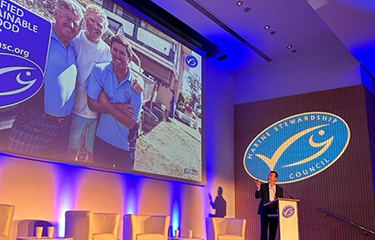At its Seafood Futures Forum on 25 April at the 2023 Seafood Expo Global in Barcelona, Spain, Marine Stewardship Council (MSC) executive said they will continue for more fisheries certificaiton and wider acceptance and uptake of sustainable seafood.
The event featured MSC Chief Executive Rupert Howes, MSC Chief Program Officer Nicolas Guichoux, and United Nations Food and Agriculture Organization Fisheries and Aquaculture Division Director Manuel Barange, and was attended by more than 300 seafood industry stakeholders.
Guichoux said 19 percent of all wild-caught seafood globally by volume is currently certified or in the process of being certified to the MSC standard. An additional 42 fisheries achieved MSC certification within the past year across 15 species.
Latin American and Indonesian fisheries have seen an uptick in certification in recent years, and on the sales side, Southern Europe, North America, and Japan have increased their demand and purchasing of MSC-certified seafood, with total sales of MSC-certified products up 9 percent year-over-year, according to Guichoux.
“Increasing consumer awareness of the impact that food has on the planet is influencing retailers’ sourcing policies and therefore the way the ocean is fished,” Guichoux said.
Howes said MSC will launch a promotional and public awareness campaign that will run for a year beginning 8 June, 2023, which is World Oceans Day 2023. He said the campaign is part of a larger strategy to grow consumption of sustainable seafood, solidify public acceptance of nonprofits as the standard-bearers for the sustainable seafood movement, and expand market opportunities to incentivize responsible fishery practices.
“Climate change and overexploitation present an existential threat to our oceans and seafood supplies,” Howes said. “The last year has seen breakthroughs in a number of international agreements, including on ocean biodiversity which, if implemented, could help safeguard our shared ocean. The MSC will support governments, industry, fishers, scientists, and conservationists to build on this momentum and turn pledges into tangible progress.”
Barange spoke on the importance of the U.N. Sustainable Development Goals (SDGs) and the U.N.'s blue transformation strategy.
“There is now wide acceptance across governments that aquatic foods will play a fundamental role in feeding a growing population while reducing carbon emissions and pressure on land-based sources of food - but only if it is produced in a sustainable way,” Barange said. “Emerging policies, investment, and support for aquatic foods offer new opportunities for seafood businesses to transform the way they operate.”
Photo by Bhavana Scalia-Bruce/SeafoodSource







